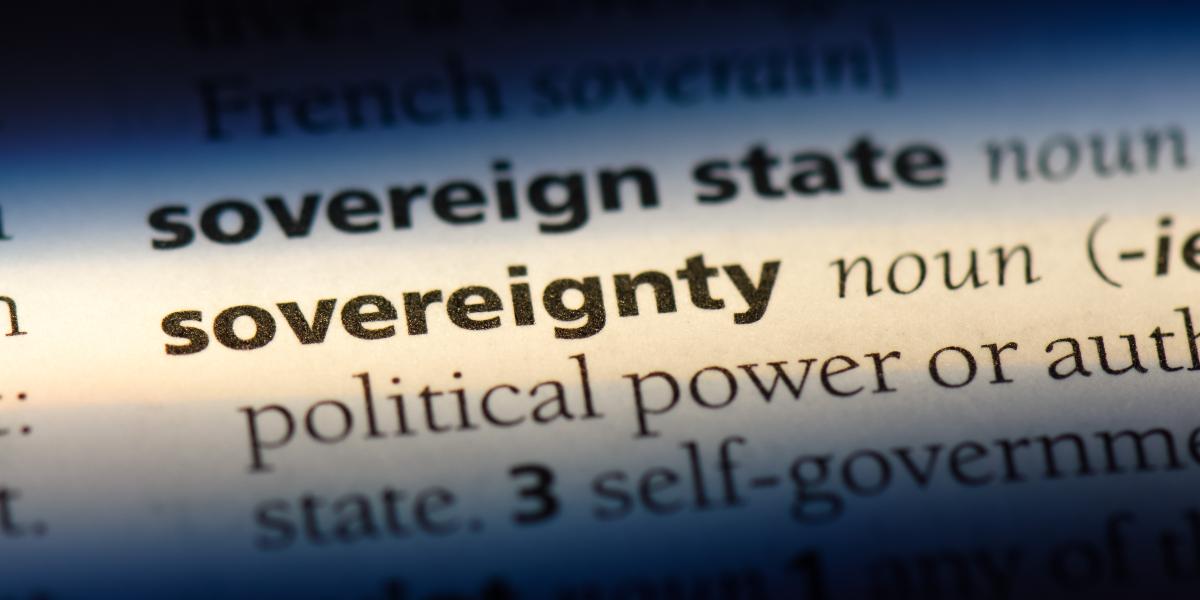The issue of sovereignty had been a hotly-debated topic among the Revolutionary-era colonists. In The Ideological Origins of the American Revolution, historian Bernard Bailyn says that in “The last analysis it was over this issue that the Revolution was fought.” Thomas Hobbes—writing in the mid-seventeenth century—Bailyn continues, argued that the only requirement of a sovereign was the capacity to compel obedience, which didn’t necessarily mean the king.
Final, unqualified, indivisible power was . . . only one part of the notion of sovereignty as it was understood by Englishmen on the eve of the American Revolution. The other concerns its location. Who, or what body, was to hold such powers?
In John Locke’s Second Treatise on Government, he said man’s natural liberty was to be free from any power other than the laws of nature, but when people associate with one another, this changes slightly: “The liberty of man, in society, is to be under no other legislative power, but that established, by consent.”
When Thomas Jefferson reluctantly undertook the task of writing the Declaration of Independence in 1776, in addition to a list of indictments against the King, his rough draft included thoughts acknowledging what was required for people to get along peacefully:
We hold these truths to be sacred & undeniable; that all men are created equal & independant, that from that equal creation they derive rights inherent & inalienable, among which are the preservation of life, & liberty, & the pursuit of happiness; that to secure these ends, governments are instituted among men, deriving their just powers from the consent of the governed. . .
Notwithstanding the issue of slavery, Lockean natural rights dominated intellectual discourse in the colonies, and Jefferson stayed the course in his draft and revisions.
In his absorbing work, Patriots, A. J. Langguth tells us, “The ideas [Jefferson] would be including had been in the air for many years, and he knew the arguments so well that he didn’t need books or pamphlets in front of him as he wrote. . . ” Jefferson had a list of essential books that, in addition to those by Locke, included Thomas Reid’s Inquiry into the Human Mind, in which he argued that moral truths could be reached through reason or presented as self-evident “to every man of understanding and morality.” Thus, in revising his draft, Jefferson “struck out ‘sacred and undeniable’ and wrote in ‘self evident.’ He continued through his draft, paring words away to make his language bolder.”
Government was to be established “by consent” of the governed. “By consent”—did this answer the question of sovereignty? Did Americans secede from England to establish sovereignty in a domestic body formed by the consent of the governed that would guarantee Jeffersonian liberty to those who granted consent? And was this consent to be unanimous? If not, what then? Did their ideas on consent need refining?
In 1760, an impetuous but erudite lawyer, James Otis, had argued a writs of assistance case in Boston against his tutor in law, Jeremiah Gridley. A young John Adams was in attendance, taking notes furiously. In defending the principle of a search warrant, Gridley argued, per Langguth,
How could a state protect itself against foreign enemies or subversives at home? Which was more important, protecting the liberty of an individual or collecting the taxes efficiently? Gathering public money must take precedence.
After Gridley finished, “in wig and black gown, James Otis stood up to speak, and something profound changed in America.” To Adams, “Otis rose in the hall like a flame of fire. He seemed to overflow with dates, events, legal precedents, classical allusions.”
What did Otis say that shook the foundations of political theory?
Every man was his own sovereign, subject to laws engraved on his heart and revealed to him by his Maker. No other creature on earth could legitimately challenge a man’s right to his life, his liberty and his property. That principle, that unalterable law, took precedence—here Otis was answering Gridley directly—even over the survival of the state. (emphasis added)
In January 1776, six months before Jefferson authored his draft, Thomas Paine published Common Sense that denied the sovereignty of the king, claiming he originated as “the principal ruffian of some restless gang.” Over time, the idea of hereditary rights developed and were crammed “down the throats of the vulgar” to add a false sense of dignity to the monarch. “What at first was submitted to as a convenience,” Paine concludes, “was afterwards claimed as a right.” To Paine, having a sovereign had been a convenience until it wasn’t.
Years later, in Paine’s Rights of Man, Part II, he clarified his position on government:
A great part of that order which reigns among mankind is not the effect of government. It had its origin in the principles of society and the natural constitution of man. It existed prior to government, and would exist if the formality of government was abolished. The mutual dependence and reciprocal interest which man has upon man, and all parts of a civilized community upon each other, create that great chain of connection which holds it together. The landholder, the farmer, the manufacturer, the merchant, the tradesman, and every occupation, prospers by the aid which each receives from the other, and from the whole. Common interest regulates their concerns, and forms their laws; and the laws which common usage ordains, have a greater influence than the laws of government. In fine, society performs for itself almost every thing which is ascribed to government.
Do you get the impression Paine is describing the power of the free market? If sovereignty implies ultimate power in a social setting, we should abandon the idea of consent to what turned out to be a robber state and allow the market to prevail.
In America, it’s apparent the sovereign is not even the occupant of the Oval Office, but the Deep State (see THE DEEP STATE ENCYCLOPEDIA: Exposing the Cabal’s Playbook). Étienne de La Boétie’s Discourse on Voluntary Servitude—written as a teenager in 16th-century France—argues that people are in charge of their own subjugation. The solution? Stop cooperating. Allow your latent love of liberty to prevail over obedience to a false sovereign.
I have suggested ways of accomplishing this here.



























